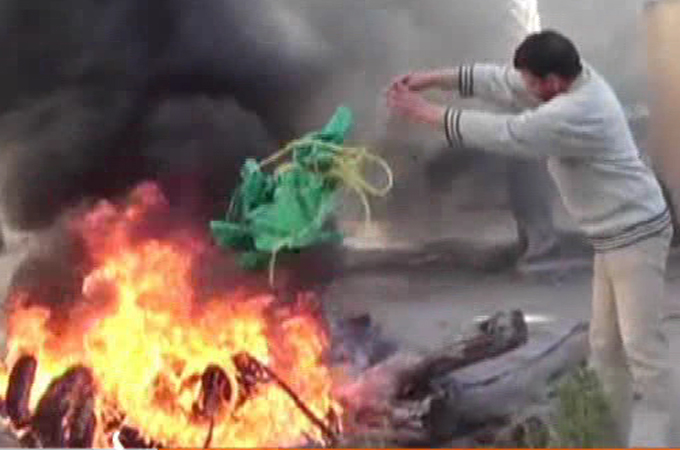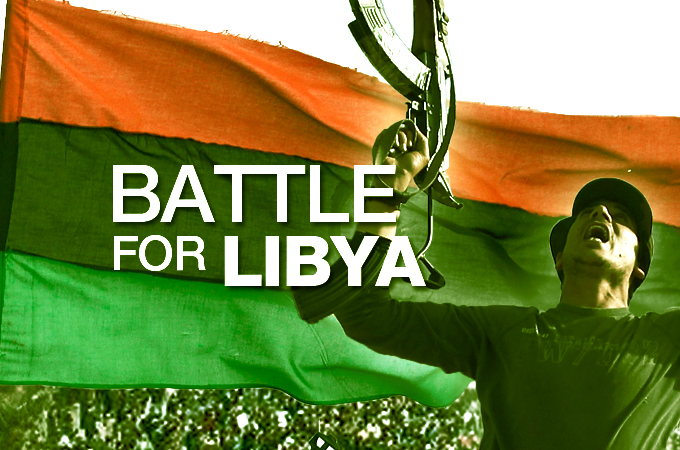Rebels warn of ‘massacre’ in Misurata
Artillery barrage kills at least 23 in besieged Libyan city while port entry point for humanitarian aid also attacked.

 |
| A television shot of the centre of Misurata, which was hit with a rocket attack, reportedly killing 23 people [Al Jazeera] |
Rebels have warned of an impending “massacre” by troops loyal to Muammar Gaddafi if NATO does not intensify its attacks on government forces in and around Misurata, which has been besieged for weeks.
Libyan government forces launched a heavy attack against the coastal city on Thursday, with dozens of Grad rockets, killing at least 23 people, a rebel spokesman said.
Misurata, Libya’s third-biggest city, is the only major rebel stronghold in the west of the country. It has been the scene of major fighting between rebels and Gaddafi’s forces for several weeks.
“They fired Grads at a residential area called Kasr Ahmad near the port this morning. They fired at least 80 rockets on that area,” Abdelbasset Abu Mzereiq told Reuters by telephone.
He later clarified that those killed had been civilians and not rebel fighters as earlier understood. The death toll from the 90 minute artillery barrage was likely to rise, the spokesman added.
“They keep killing civilians. Yesterday we lost five civilians in the shelling and 37 were wounded.”
Gaddafi loyalists were firing shells on Tripoli Street, a thoroughfare which cuts to the city centre from the western outskirts, eyewitnesses told Al Jazeera.
The rocket assault on the residential area near the rebel-controlled port had also prevented a Qatari vessel from docking, another rebel spokesman said. It was not immediately clear what the ship was carrying.
Gaddafi’s forces maintain assault
It is difficult to independently verify accounts from western Libya because journalists are prevented from reporting freely. Electricity and communications lines to the city have been cut while a rebel spokesman told Al Jazeera that the city faced food shortages.
Al Jazeera’s Hoda Abdel-Hamid, reporting from Benghazi, said that “Gaddafi’s forces are still using their fire power” in “quite significant” ways.
“They did pound the city of Misurata,” said Abdel-Hamid. “According to an opposition spokesman, they were actually queuing up at a bakery this morning when they came under attack by Grad missiles,” said Abdel-Hamid.
She added that Misurata’s port, the entry point for any humanitarian aid, had also come under attack.
“We have seen some pictures and some very graphic videos of wounds and casualties in Misurata – stuff we really can’t broadcast because they’re so graphic – but they do tell you about how bad the situation is in that city.”
Disparate international response
While the rebels have made it clear that they will be crushed without NATO support, the international community is struggling to come up with a united approach.
NATO member states are meeting in Berlin on Thursday and Friday to discuss their response to the crisis amid internal disagreements over the extent of the military alliance’s support for the rebels.
The five so-called BRICS emerging powers – Brazil, Russia, India, China and South Africa – expressed misgivings about NATO air strikes after talks in China and urged an end to the two-month conflict.
 |
Their criticism contrasted with the first joint call for Gaddafi’s overthrow from a group of Middle Eastern and Western countries meeting in Qatar on Wednesday.
In its strongest language yet, the international “contact group” on Libya demanded that Gaddafi leave power and voiced support for the rebels, while Washington has taken a back seat after handing command to NATO on March 31.
Amid a flurry of international diplomacy, UN Secretary General Ban Ki-moon, Catherine Ashton, EU foreign policy chief, Amr Moussa, Arab League head and officials from the African Union and Organisation of the Islamic Conference discussed the war at a meeting in Cairo on Thursday.
A few dozen pro and anti-Gaddafi protesters demonstrated outside the meeting at Arab League headquarters.
Ban expressed grave concern over the escalation of violence in Libya and called for a ceasefire and the relief of besieged cities. The longer fighting went on, the more difficult a political solution would be, he said.